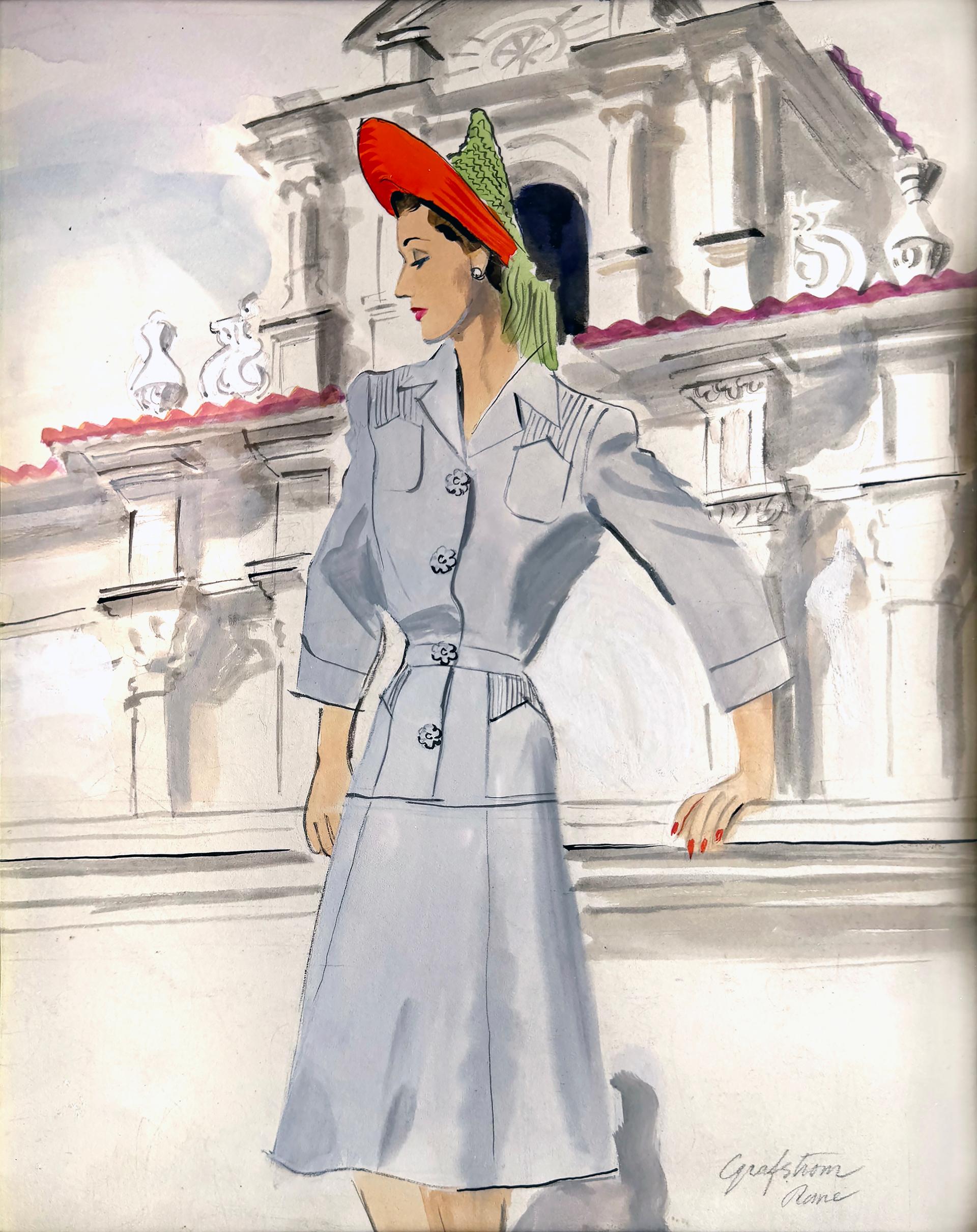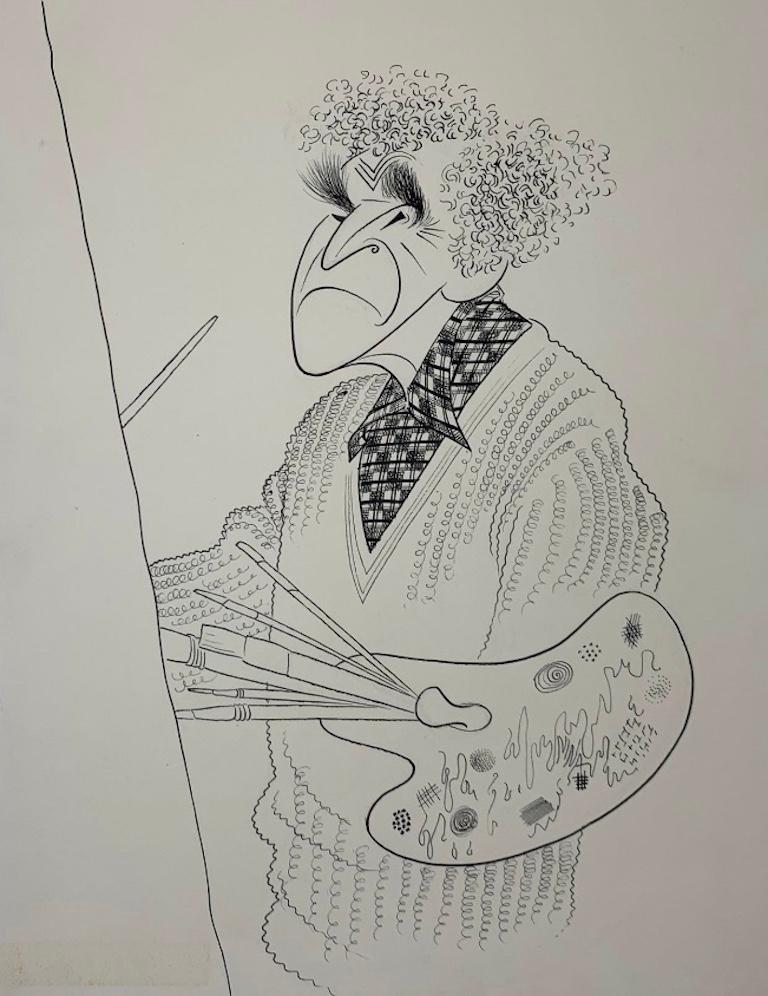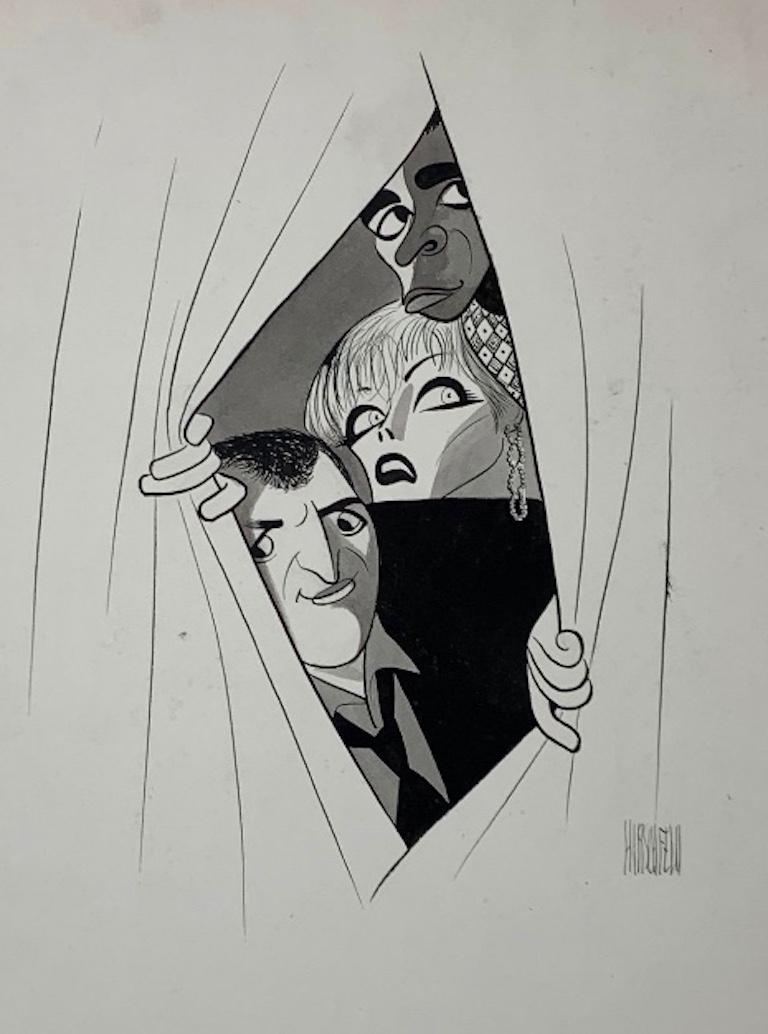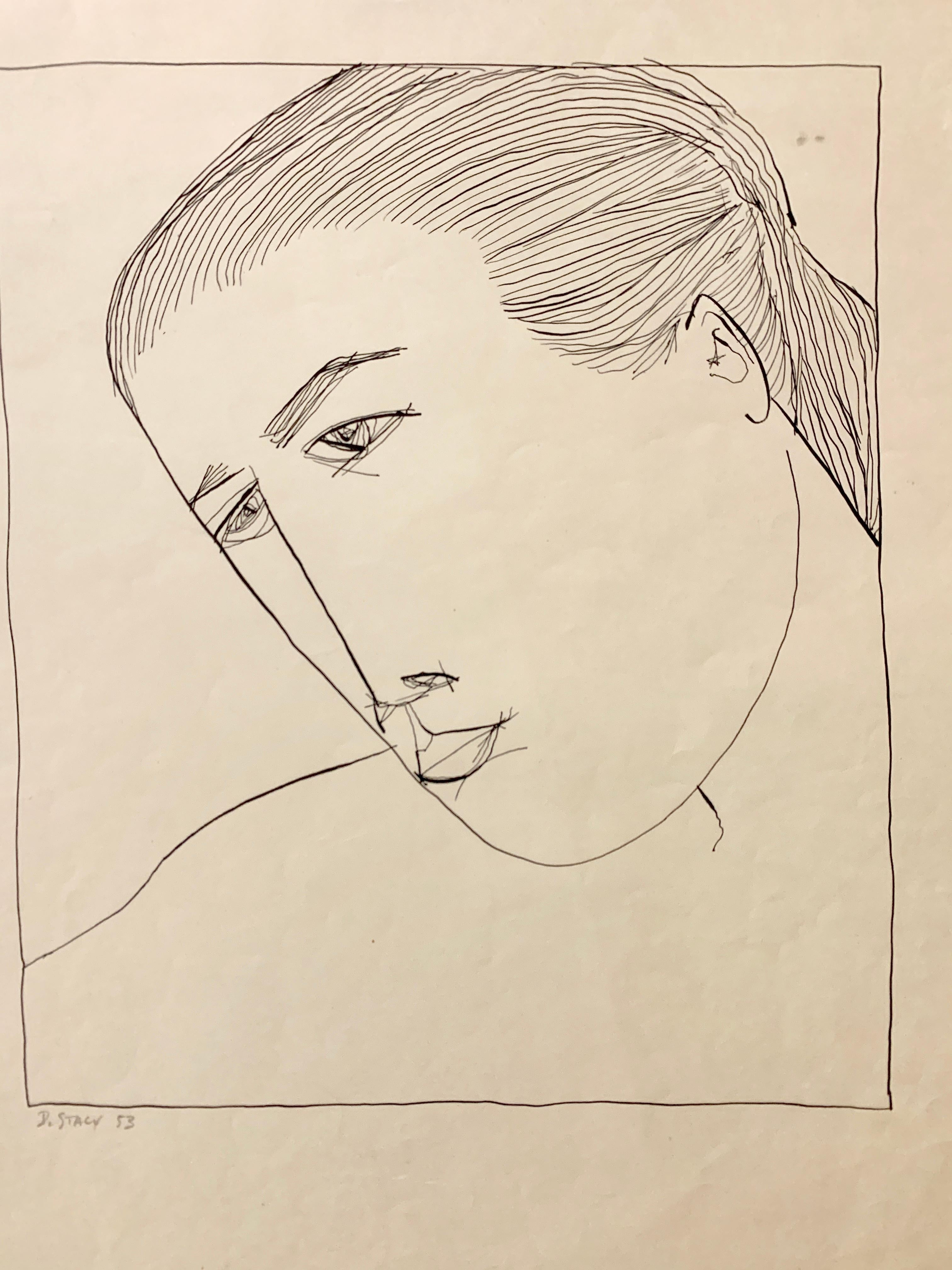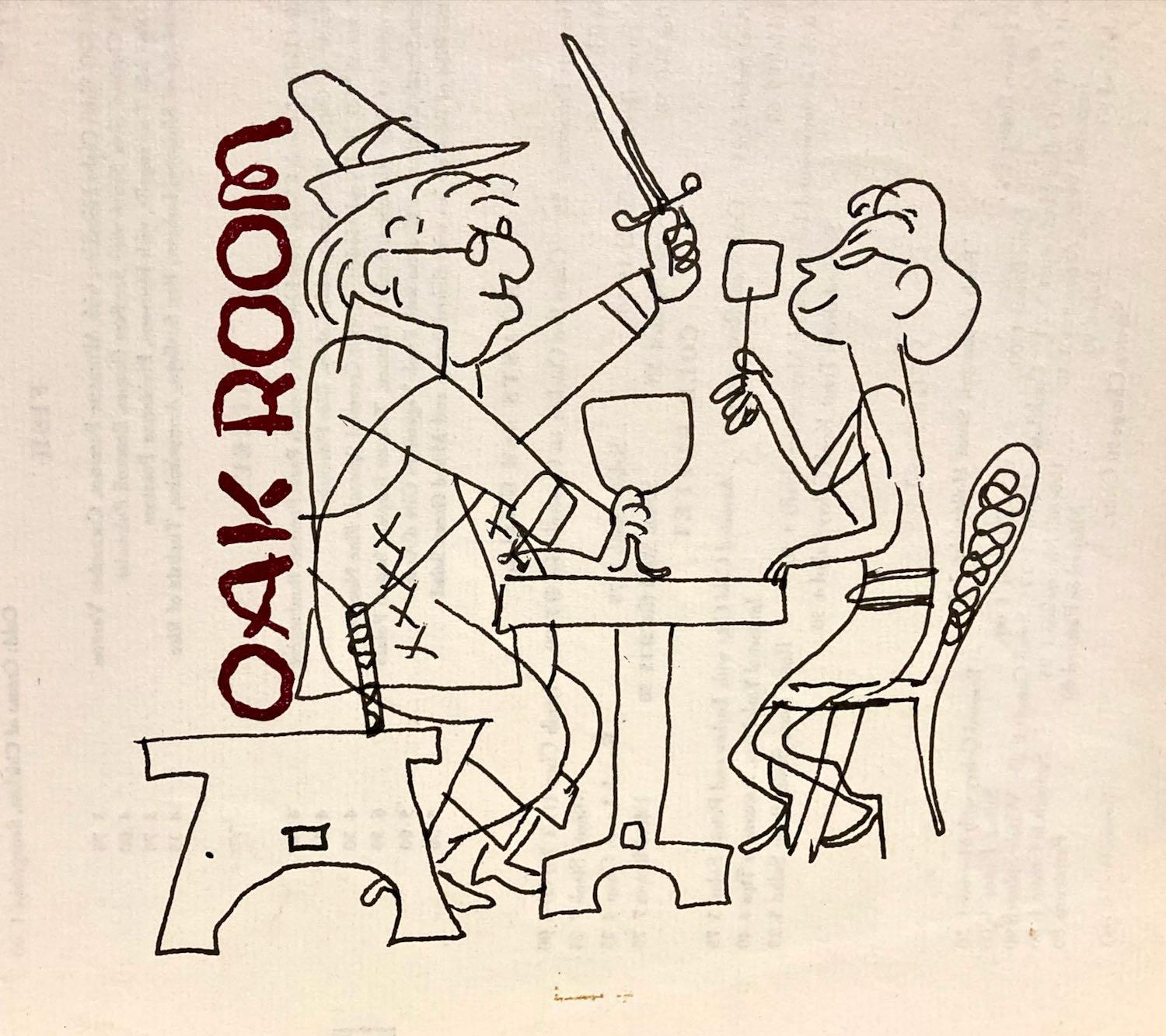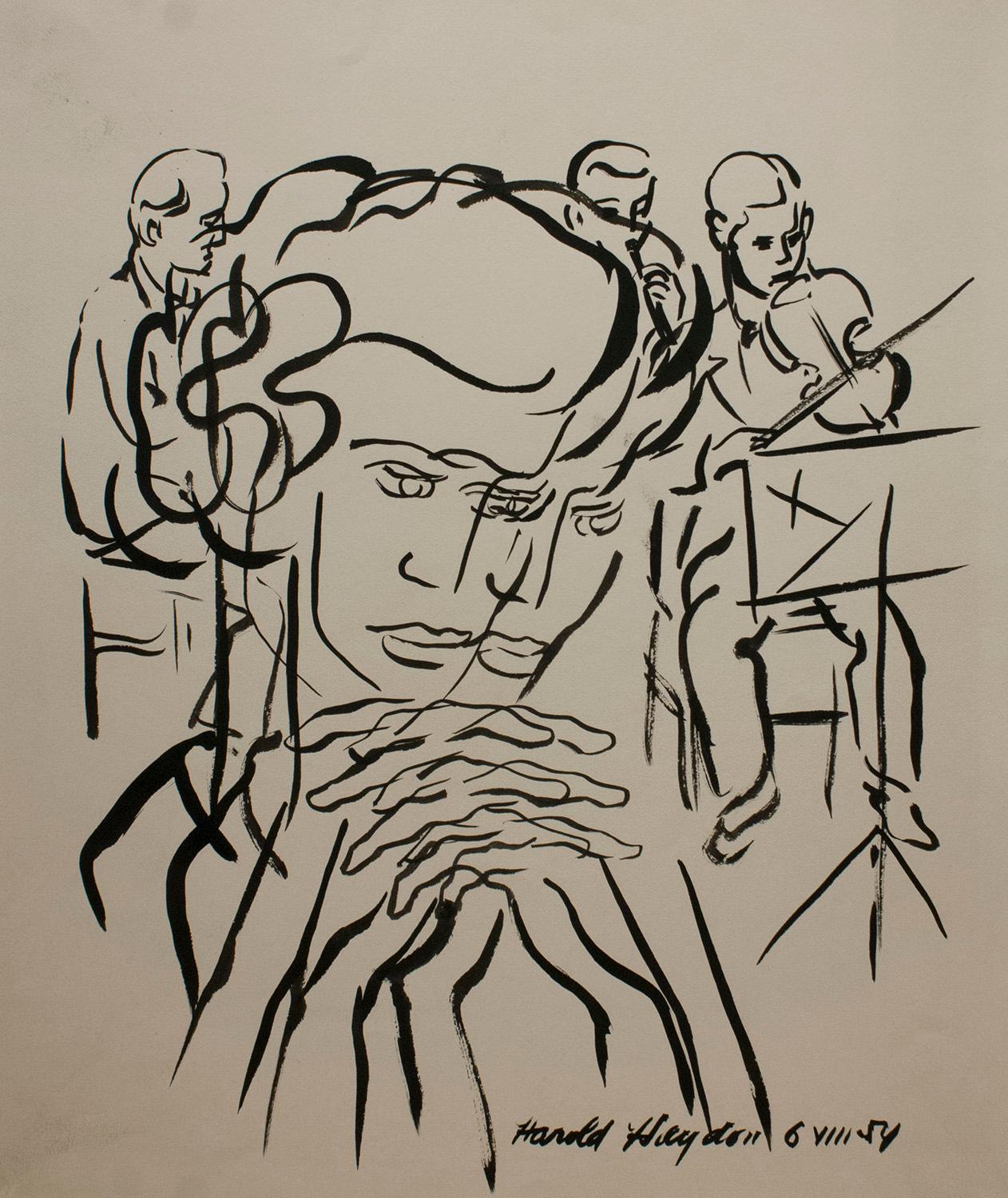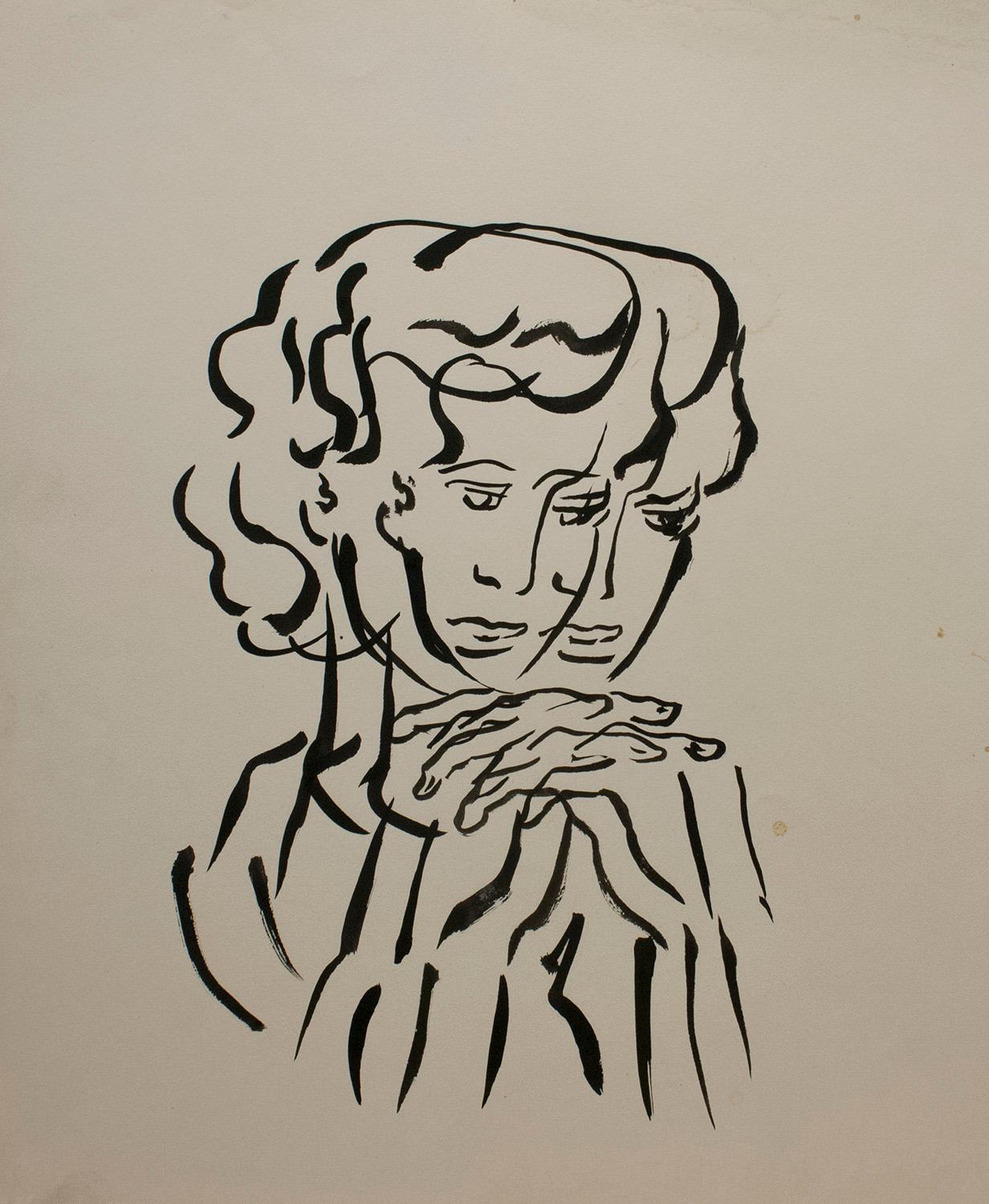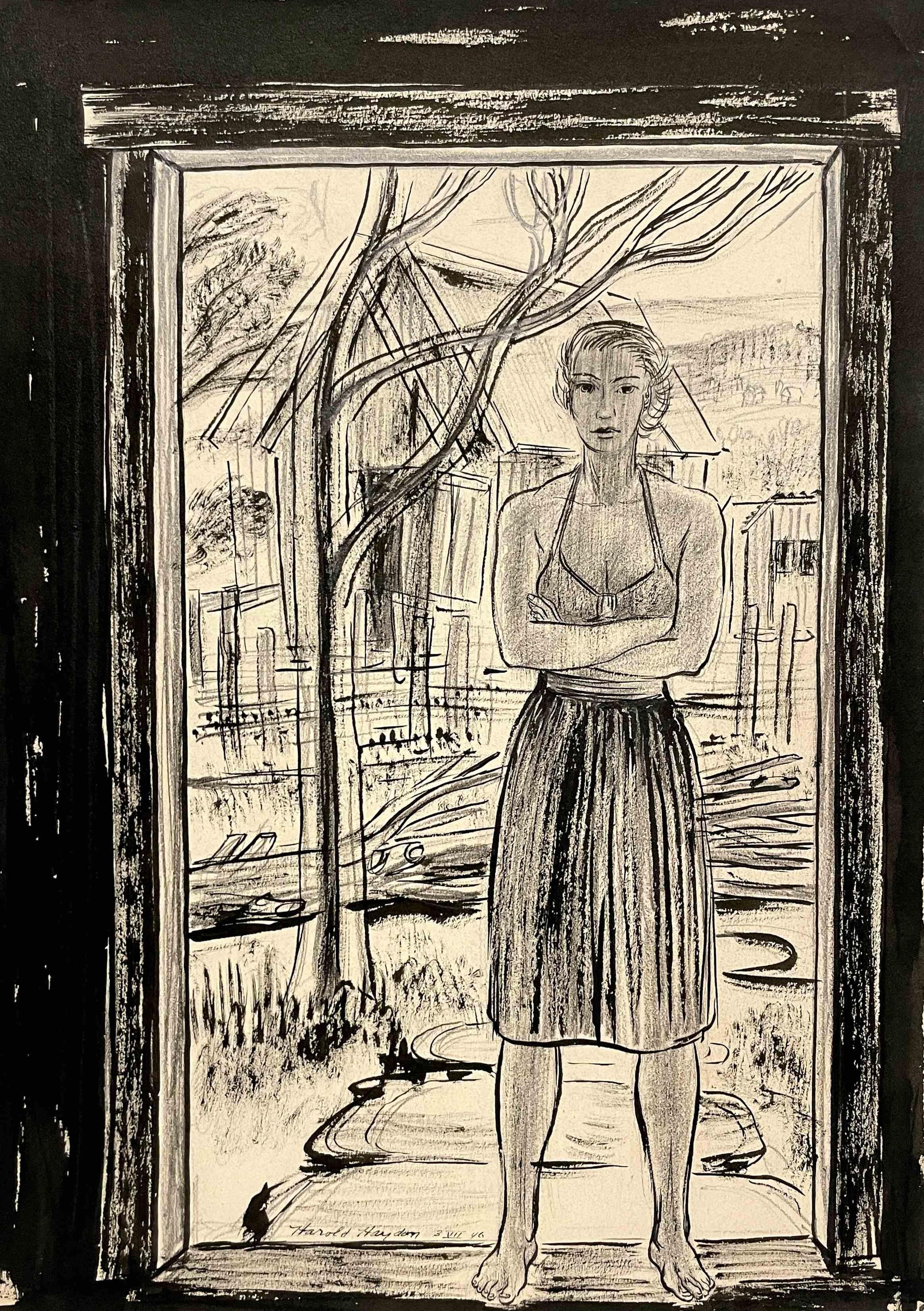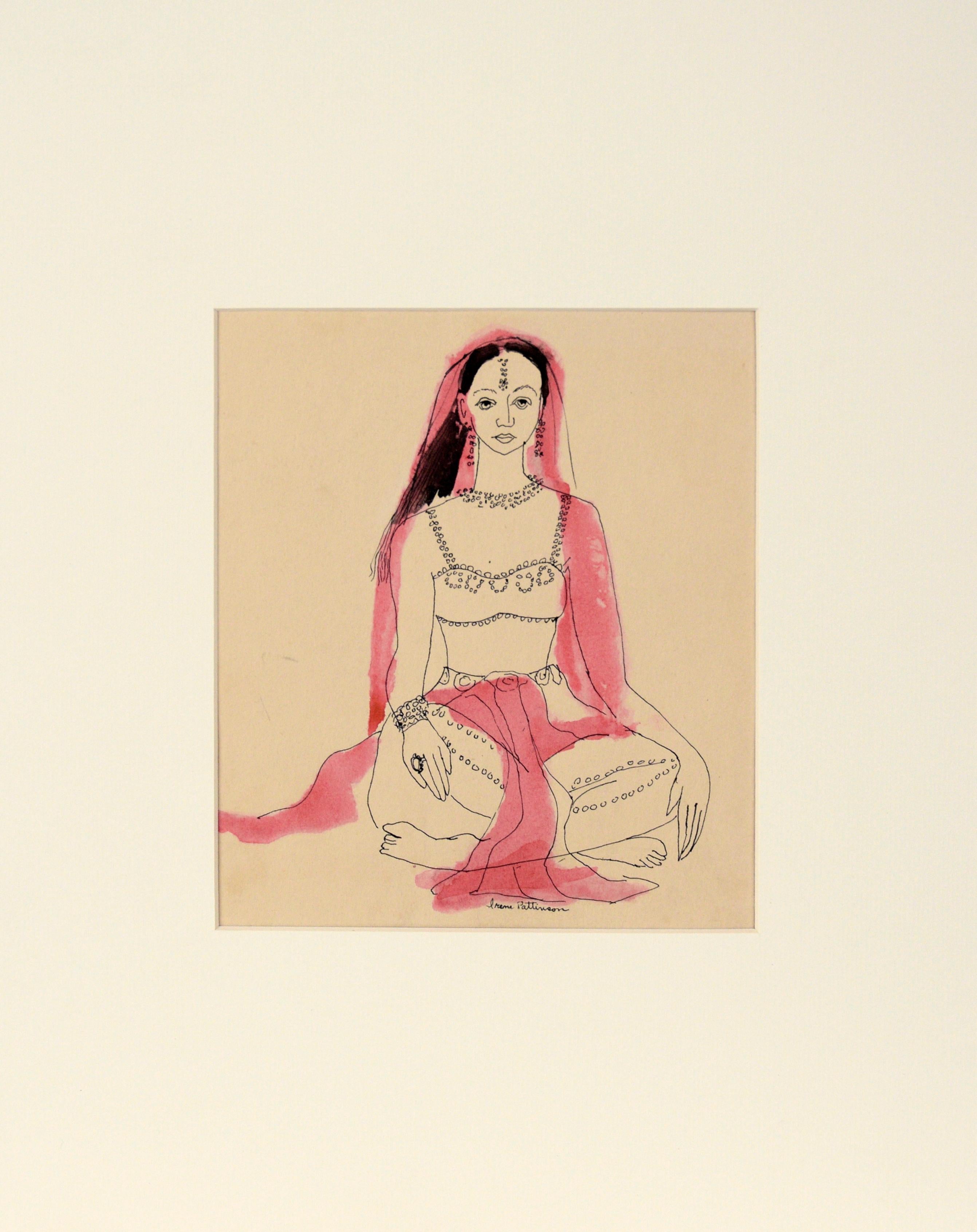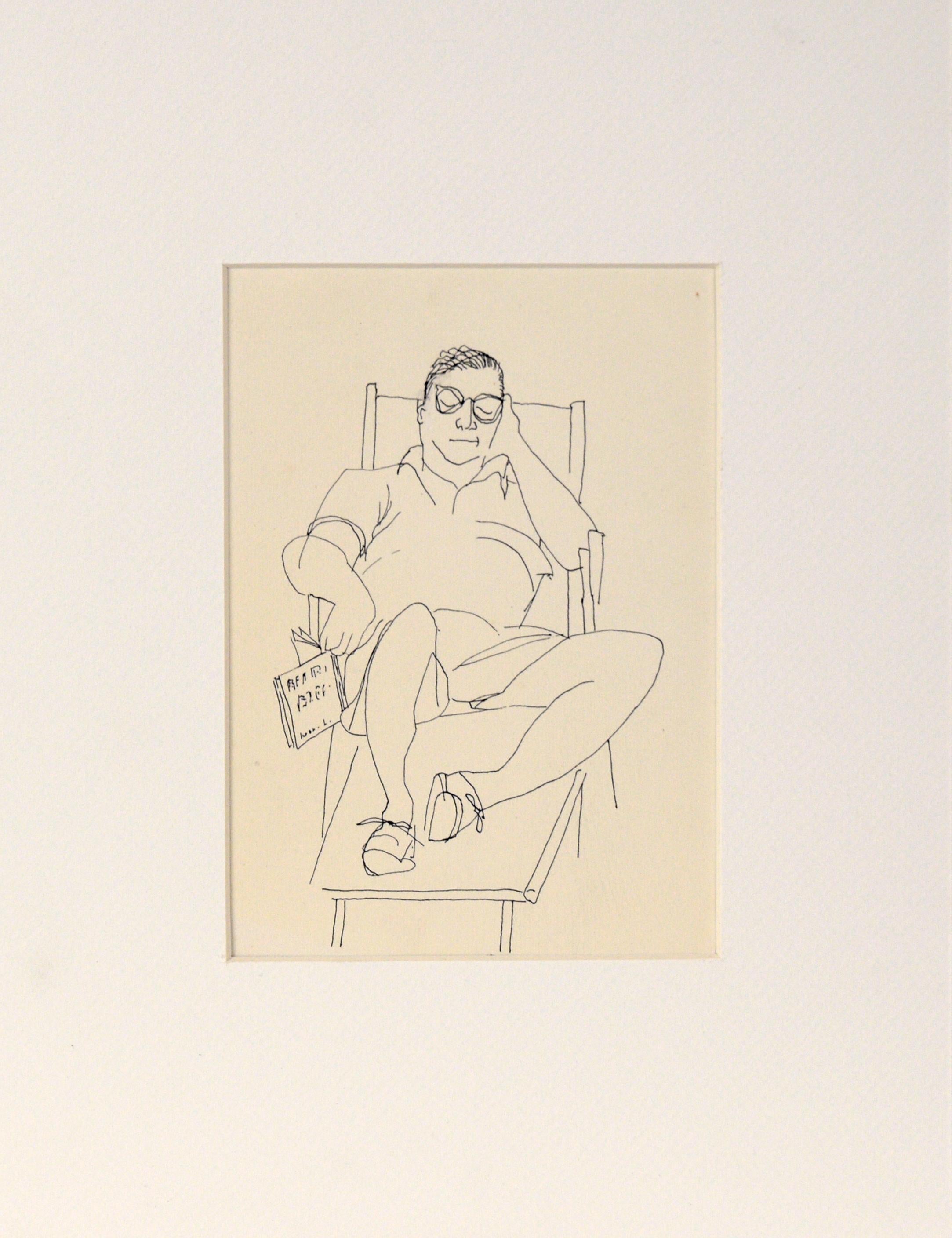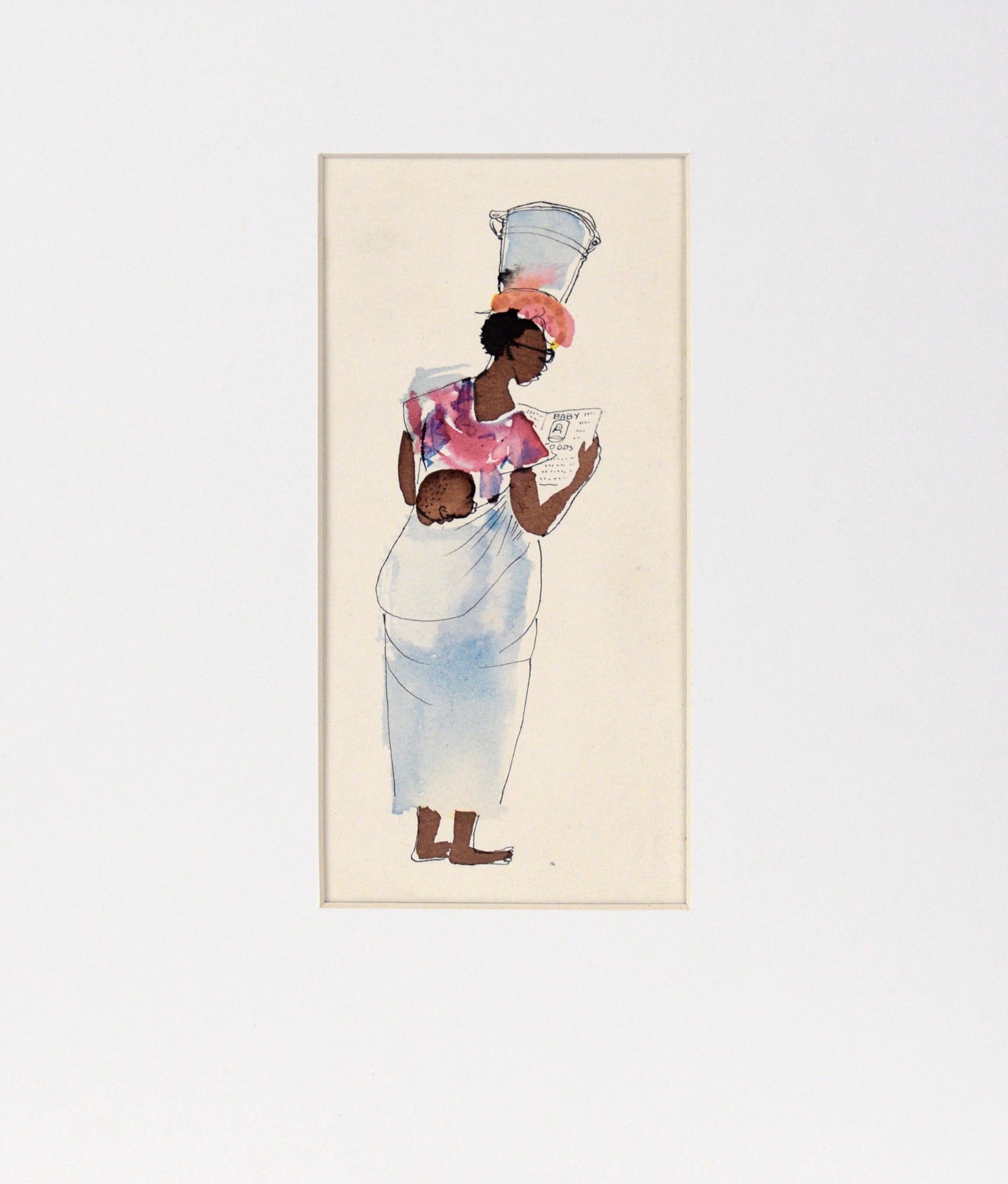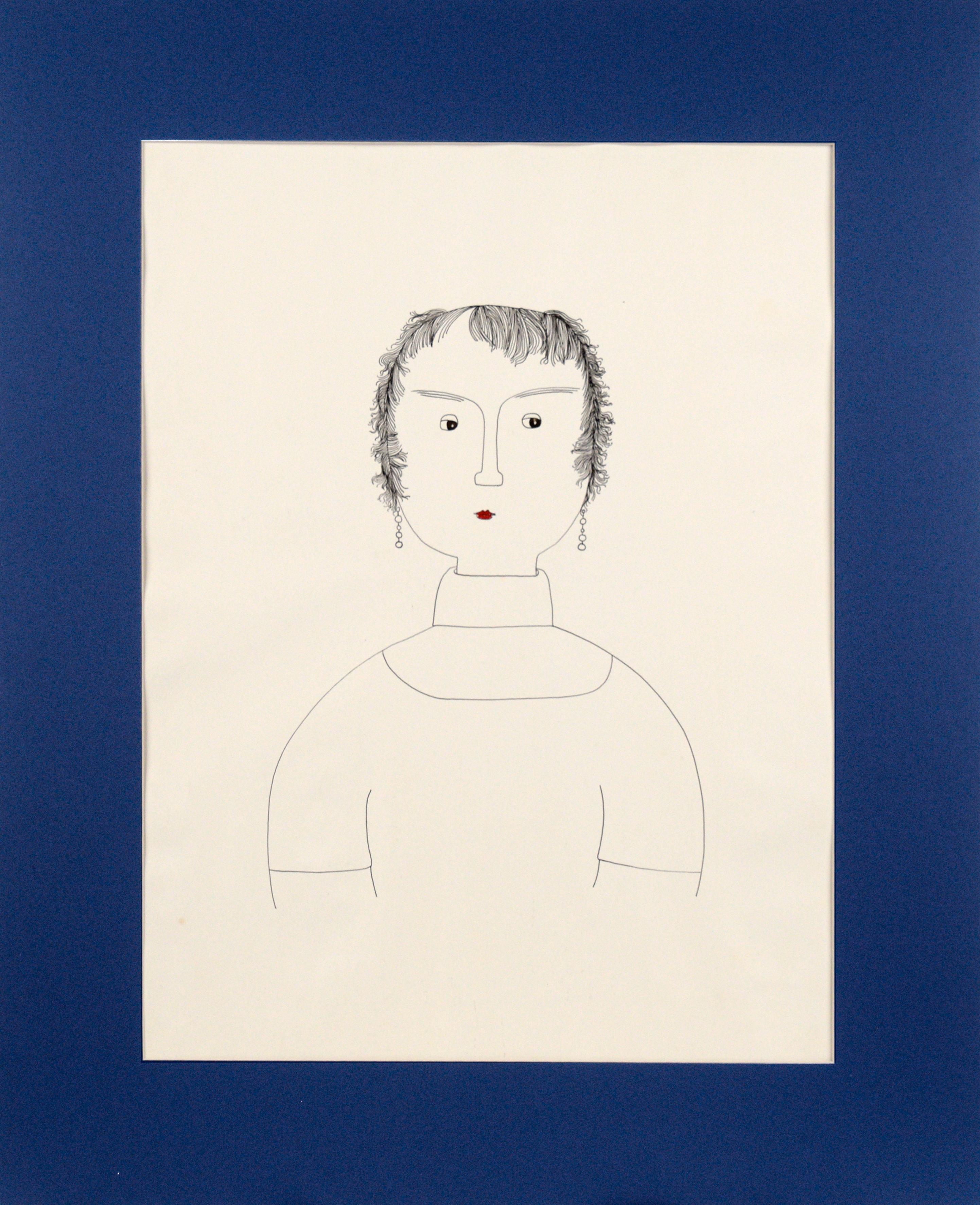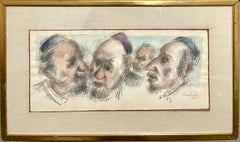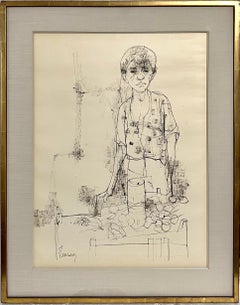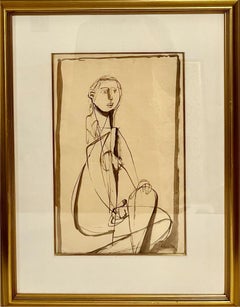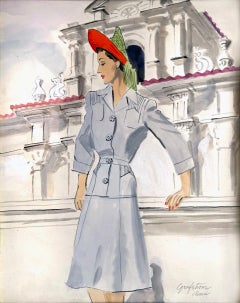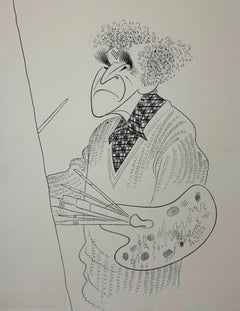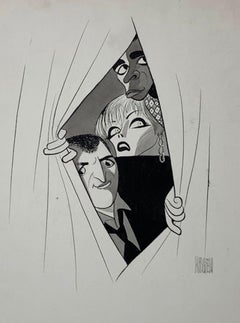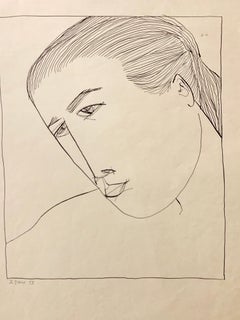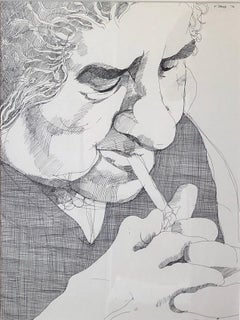
Golda Meir Israeli Woman Prime Minister Smoking Cigarette Ink Line Drawing 1972
View Similar Items
Want more images or videos?
Request additional images or videos from the seller
1 of 11
Nancy DrosdGolda Meir Israeli Woman Prime Minister Smoking Cigarette Ink Line Drawing 19721972
1972
Price:$960
$1,200List Price
About the Item
- Creator:Nancy Drosd (1918 - 2018)
- Creation Year:1972
- Dimensions:Height: 25.5 in (64.77 cm)Width: 20.25 in (51.44 cm)Depth: 1 in (2.54 cm)
- Medium:
- Movement & Style:
- Period:
- Condition:good. frame has some wear.
- Gallery Location:Surfside, FL
- Reference Number:1stDibs: LU3824480722
About the Seller
4.9
Platinum Seller
Premium sellers with a 4.7+ rating and 24-hour response times
Established in 1995
1stDibs seller since 2014
1,791 sales on 1stDibs
Authenticity Guarantee
In the unlikely event there’s an issue with an item’s authenticity, contact us within 1 year for a full refund. DetailsMoney-Back Guarantee
If your item is not as described, is damaged in transit, or does not arrive, contact us within 7 days for a full refund. Details24-Hour Cancellation
You have a 24-hour grace period in which to reconsider your purchase, with no questions asked.Vetted Professional Sellers
Our world-class sellers must adhere to strict standards for service and quality, maintaining the integrity of our listings.Price-Match Guarantee
If you find that a seller listed the same item for a lower price elsewhere, we’ll match it.Trusted Global Delivery
Our best-in-class carrier network provides specialized shipping options worldwide, including custom delivery.More From This Seller
View AllChaim Gross Judaica Jewish Watercolor Painting Rabbi Klezmer Music WPA Artist
By Chaim Gross
Located in Surfside, FL
Chaim Gross (American, 1904-1991)
Watercolor with pencil painting
Rabbi Klezmer music concert, flute player.
Hand signed
framed: 15 X 28.5, paper: 9.5 X 23
Chaim Gross (March 17, 1904 – May 5, 1991) was an American modernist sculptor and educator.
Gross was born to a Jewish family in Austrian Galicia, in the village of Wolowa (now known as Mezhgorye, Ukraine), in the Carpathian Mountains. In 1911, his family moved to Kolomyia (which was annexed into the Ukrainian USSR in 1939 and became part of newly independent Ukraine in 1991). When World War I ended, Gross and brother Avrom-Leib went to Budapest to join their older siblings Sarah and Pinkas. Gross applied to and was accepted by the art academy in Budapest and studied under the painter Béla Uitz, though within a year a new regime under Miklos Horthy took over and attempted to expel all Jews and foreigners from the country. After being deported from Hungary, Gross began art studies at the Kunstgewerbeschule in Vienna, Austria shortly before immigrating to the United States in 1921. Gross's studies continued in the United States at the Beaux-Arts Institute of Design, where he studied with Elie Nadelman and others, and at the Art Students League of New York, with Robert Laurent. He also attended the Educational Alliance Art School, studying under Abbo Ostrowsky, at the same time as Moses Soyer and Peter Blume.
In 1926 Gross began teaching at The Educational Alliance, and continued teaching there for the next 50 years. Louise Nevelson was among his students at the Alliance (in 1934), during the time she was transitioning from painting to sculpture. In the late 1920s and early 1930s he exhibited at the Salons of America exhibitions at the Anderson Galleries and, beginning in 1928, at the Whitney Studio Club. In 1929, Gross experimented with printmaking, and created an important group of 15 linocuts and lithographs of landscapes, New York City streets and parks, women in interiors, the circus, and vaudeville. The entire suite is now in the collection of the Philadelphia Museum of Art. Gross returned to the medium of printmaking in the 1960s, and produced approximately 200 works in the medium over the next two decades. For more than sixty years Chaim Gross's art has expressed optimistic, affirming themes, Judaica, balancing acrobats, cyclists, trapeze artists and mothers and children convey joyfulness, modernism, exuberance, love, and intimacy. This aspect of his work remained consistent with his Jewish Hasidic heritage, which teaches that only in his childlike happiness is man nearest to God.
In March 1932 Gross had his first solo exhibition at Gallery 144 in New York City. For a short time they represented Gross, as well as his friends Milton Avery, Moses Soyer, Ahron Ben-Shmuel and others.
Gross was primarily a practitioner of the direct carving method, with the majority of his work being carved from wood. Other direct carvers in early 20th-century American art include William Zorach, Jose de Creeft, and Robert Laurent. Works by Chaim Gross can be found in major museums and private collections throughout the United States, with substantial holdings (27 sculptures) at the Hirshhorn Museum and Sculpture Garden. A key work from this era, now at the Smithsonian American Art Museum, is the 1932 birds-eye maple Acrobatic Performers, which is also only one and one quarter inch thick.
In 1933 Gross joined the government's PWAP (Public Works of Art Project), which transitioned into the WPA (Works Progress Administration), which Gross worked for later in the 1930s. Under these programs Gross taught and demonstrated art, made sculptures that were placed in schools and public colleges, made work for Federal buildings including the Federal Trade Commission Building, and for the France Overseas and Finnish Buildings at the 1939 New York World's Fair. Gross was also recognized during these years with a silver medal at the Exposition universelle de 1937 in Paris, and in 1942, with a purchase prize at the Metropolitan Museum of Art's "Artists for Victory" exhibition for his wood sculpture of famed circus performer Lillian Leitzel.
In 1949 Gross sketched Chaim Weizmann, Israeli President, at several functions in New York City where Weizmann was speaking, Gross completed the bust in bronze later that year. Gross returned to Israel for three months in 1951 (the second of many trips there in the postwar years) to paint a series of 40 watercolors of life in various cities. This series was exhibited at the Jewish Museum (Manhattan) in 1953. He also did some important Hebrew medals.
In the 1950s Gross began to make more bronze sculptures alongside his wood and stone pieces, and in 1957 and 1959 he traveled to Rome to work with famed bronze foundries including the Nicci foundry. At the end of the decade Gross was working primarily in bronze which allowed him to create open forms, large-scale works and of course, multiple casts. Gross's large-scale bronze The Family, donated to New York City in 1991 in honor of Mayor Ed Koch, and installed at the Bleecker Street Park at 11th street, is now a fixture of Greenwich Village. In 1959, a survey of Gross's sculpture in wood, stone, and bronze was featured in the exhibit Four American Expressionists curated by Lloyd Goodrich at the Whitney Museum of American Art, with work by Abraham Rattner, Doris Caesar, and Karl Knaths. In 1976, a selection from Gross's important collection of historic African sculpture, formed since the late 1930s, was exhibited at the Worcester Art Museum in the show The Sculptor's Eye: The African Art Collection of Mr. and Mrs. Chaim Gross. Gross was elected into the National Academy of Design as an Associate member, and became a full Academician in 1981. In 1984, he was inducted into the American Academy of Arts and Letters, with Jacob Lawrence and Lukas Foss. In the fall of 1991, Allen Ginsberg gave an important tribute to Gross at the American Academy of Arts and Letters, which is published in their Proceedings. In 1994, Forum Gallery, which now represents the Chaim Gross estate, held a memorial exhibition featuring a sixty-year survey of Gross's work.In March 1932 Gross had his first solo exhibition at Gallery 144 in New York City. For a short time they represented Gross, as well as his friends Milton Avery, Moses Soyer, Ahron Ben-Shmuel and others.
Gross was primarily a practitioner of the direct carving method, with the majority of his work being carved from wood. Other direct carvers in early 20th-century American art include William Zorach, Jose de Creeft, and Robert Laurent. Works by Chaim Gross can be found in major museums and private collections throughout the United States, with substantial holdings (27 sculptures) at the Hirshhorn Museum and Sculpture Garden. A key work from this era, now at the Smithsonian American Art Museum, is the 1932 birds-eye maple Acrobatic Performers, which is also only one and one quarter inch thick.
In 1933 Gross joined the government's PWAP (Public Works of Art Project), which transitioned into the WPA (Works Progress Administration), which Gross worked for later in the 1930s. Under these programs Gross taught and demonstrated art, made sculptures that were placed in schools and public colleges, made work for Federal buildings including the Federal Trade Commission Building, and for the France Overseas and Finnish Buildings at the 1939 New York World's Fair. Gross was also recognized during these years with a silver medal at the Exposition universelle de 1937 in Paris, and in 1942, with a purchase prize at the Metropolitan Museum of Art's "Artists for Victory" exhibition for his wood sculpture of famed circus performer Lillian Leitzel.
In 1949 Gross sketched Chaim Weizmann, President of Israel, at several functions in New York City where Weizmann was speaking, Gross completed the bust in bronze later that year. Gross returned to Israel for three months in 1951 (the second of many trips there in the postwar years) to paint a series of 40 watercolors of life in various cities. This series was exhibited at the Jewish Museum (Manhattan) in 1953.
In the 1950s Gross began to make more bronze sculptures alongside his wood and stone pieces, and in 1957 and 1959 he traveled to Rome to work with famed bronze foundries including the Nicci foundry. At the end of the decade Gross was working primarily in bronze which allowed him to create open forms, large-scale works and of course, multiple casts. Gross's large-scale bronze The Family, donated to New York City in 1991 in honor of Mayor Ed Koch, and installed at the Bleecker Street Park at 11th street, is now a fixture of Greenwich Village. In 1959, a survey of Gross's sculpture in wood, stone, and bronze was featured in the exhibit Four American Expressionists curated by Lloyd Goodrich at the Whitney Museum of American Art, with work by Abraham Rattner, Doris Caesar, and Karl Knaths. In 1976, a selection from Gross's important collection of historic African sculpture, formed since the late 1930s, was exhibited at the Worcester Art Museum in the show The Sculptor's Eye: The African Art Collection of Mr. and Mrs. Chaim Gross. Gross was elected into the National Academy of Design as an Associate member, and became a full Academician in 1981. In 1984, he was inducted into the American Academy of Arts and Letters, with Jacob Lawrence and Lukas Foss. In the fall of 1991, Allen Ginsberg gave an important tribute to Gross at the American Academy of Arts and Letters, which is published in their Proceedings. In 1994, Forum Gallery, which now represents the Chaim Gross estate, held a memorial exhibition featuring a sixty-year survey of Gross's work.
Gross was a professor of printmaking and sculpture at both the Educational Alliance and the New School for Social Research in New York City, as well as at the Brooklyn Museum Art School, the MoMA art school, the Art Student's League and the New Art School (which Gross ran briefly with Alexander Dobkin...
Category
Mid-20th Century American Modern Figurative Drawings and Watercolors
Materials
Paper, Watercolor
Chaim Gross Mid Century Mod Judaica Jewish Watercolor Painting Rabbis WPA Artist
By Chaim Gross
Located in Surfside, FL
Chaim Gross (American, 1904-1991)
Watercolor painting
Rabbinical Talmudic Discussion
Hand signed
17 x 29 framed, paper 10 x 22
Chaim Gross (March 17, 1904 – May 5, 1991) was an ...
Category
Mid-20th Century American Modern Figurative Drawings and Watercolors
Materials
Paper, Watercolor
Large Drawing of Boy by French Armenian Modernist Jean Jansem Ecole De Paris Art
By Jean Jansem
Located in Surfside, FL
Jean Jansem (Hovhannes Semerdjian) 1920-2013
Young Boy (sad young man)
Hand signed lower left corner
Provenance: Marble Arch Gallery NYC
Measurements Image size: 25 by 18 inches, ove...
Category
1960s Modern Figurative Drawings and Watercolors
Materials
Paper, Ink
Modernist Ink and Wash Drawing, Painting Jankel Adler Woman Model Ecole De Paris
By Jankel Adler
Located in Surfside, FL
Jankel Adler (Polish, 1895–1949)
'Seated Nude'
Watercolor in sepia tones on paper,
Hand signed
Dimensions: Framed 26 x 20 inches, sheet 17.88 x 14.75 inches
Provenance: Bears a la...
Category
Mid-20th Century Modern Figurative Drawings and Watercolors
Materials
Paper, Ink
Latin American Art Ink Drawing Mario Perez Nachimiento Argentina Modernist
By Mario Perez
Located in Surfside, FL
Mario Segundo Perez
Argentine, 1960–2018
Nachimiento
Ink on Paper
Dimensions: 7.5 X 9.75 with frame. sheet is 5 X 7
Does not appear to be signed on front (not examined out of frame. might be signed verso)
Provenance: The Estate of Theodore A Bonin (Ted Bonin was a principal in Alexander and Bonin, a New York gallery known for its diverse slate of conceptual artists. He started at Marlborough gallery London in the 60s, then in partnership with Brooke Alexander. In its stable were a host of esteemed artists: Willie Cole, Rita McBride, John Ahearn, Paul Thek, Doris Salcedo, Eugenio Dittborn, Dalton Paula, and Rigoberto Torres, Mona Hatoum and Emily Jacir.)
Mario Pérez was born in San Juan, Argentina in 1960. The second of seven children, and the son of a housepainter. He obtained his degree in Visual Arts at Universidad Nacional de San Juan in Argentina. A draughtsman and painter. His style was magic realist or fantastic realism
In 2003, Pérez was the recipient of a Pollock Krasner Foundation grant, one of his greatest achievements. He also had the honor of being part of the National Exhibition “200 Years-200 Masters of Argentinean Art”, commemorating the country’s bicentennial.
Mario has won international distinctions such as the Cecilia Grierson Award at the Salón Nacional de Pintura in La Plata in 1992; the Marco A. Roca Award at the Salón Pro-Arte, Córdoba, also in 1992; and the first prize in the LXXXVIII Salón Nacional de Pintura in Buenos Aires in 1999.
His art often features tiny figures in immense landscapes, and unique backgrounds. It has elements of Conceptual art. His work has been regularly featured in leading auction houses like Christie’s and Sotheby’s in New York, and private and public collections. The magic realism of Mario Segundo Pérez is characteristic of a chiefly Latin-American concept in painting, literature and film that incorporates fantastic or mythical elements into an otherwise realistic scenario. Coined in the 1940s by Cuban novelist Alejo Carpentier, the term often is used when referring to the Colombian novelist Gabriel Garcia Márquez, winner of the 1982 Nobel Prize in Literature. Influences include Frida Kahlo and George Tooker. He was in shows with Ana Fabry and Eduardo Esquivel. Paintings by Pérez are included in numerous private and public collections, including the Ciudad Casa de Gobierno (the Buenos Aires City Hall); the University of Miami School of Architecture, and the College of Communication, Architecture + The Arts (CARTA) at Florida International University.
He has been in shows with Juan Cardenas, Anna Mercedes Hoyos, Ignacio Iturria, Alejandro Obregon, Domingo Ravenet, Arnaldo Roche, Edgar Negret, Fidelio Ponce de Leon, Ricardo Martinez, Damian Gonzalez, Jorge Jimenez Deredia, Victor...
Category
20th Century Conceptual Figurative Drawings and Watercolors
Materials
Paper, Ink
Latin American Art Ink Drawing Mario Perez Sentimental Argentina Modernist
By Mario Perez
Located in Surfside, FL
Mario Segundo Perez
Argentine, 1960–2018
Sentimental
Ink on Paper
Dimensions: 7.5 X 9.75 with frame. sheet is 5 X 7
Does not appear to be signed on front (not examined out of frame. might be signed verso)
Provenance: The Estate of Theodore A Bonin (Ted Bonin was a principal in Alexander and Bonin, a New York gallery known for its diverse slate of conceptual artists. He started at Marlborough gallery London in the 60s, then in partnership with Brooke Alexander. In its stable were a host of esteemed artists: Willie Cole, Rita McBride, John Ahearn, Paul Thek, Doris Salcedo, Eugenio Dittborn, Dalton Paula, and Rigoberto Torres, Mona Hatoum and Emily Jacir.)
Mario Pérez was born in San Juan, Argentina in 1960. The second of seven children, and the son of a housepainter. He obtained his degree in Visual Arts at Universidad Nacional de San Juan in Argentina. A draughtsman and painter. His style was magic realist or fantastic realism
In 2003, Pérez was the recipient of a Pollock Krasner Foundation grant, one of his greatest achievements. He also had the honor of being part of the National Exhibition “200 Years-200 Masters of Argentinean Art”, commemorating the country’s bicentennial.
Mario has won international distinctions such as the Cecilia Grierson Award at the Salón Nacional de Pintura in La Plata in 1992; the Marco A. Roca Award at the Salón Pro-Arte, Córdoba, also in 1992; and the first prize in the LXXXVIII Salón Nacional de Pintura in Buenos Aires in 1999.
His art often features tiny figures in immense landscapes, and unique backgrounds. It has elements of Conceptual art. His work has been regularly featured in leading auction houses like Christie’s and Sotheby’s in New York, and private and public collections. The magic realism of Mario Segundo Pérez is characteristic of a chiefly Latin-American concept in painting, literature and film that incorporates fantastic or mythical elements into an otherwise realistic scenario. Coined in the 1940s by Cuban novelist Alejo Carpentier, the term often is used when referring to the Colombian novelist Gabriel Garcia Márquez, winner of the 1982 Nobel Prize in Literature. Influences include Frida Kahlo and George Tooker. He was in shows with Ana Fabry and Eduardo Esquivel. Paintings by Pérez are included in numerous private and public collections, including the Ciudad Casa de Gobierno (the Buenos Aires City Hall); the University of Miami School of Architecture, and the College of Communication, Architecture + The Arts (CARTA) at Florida International University.
He has been in shows with Juan Cardenas, Anna Mercedes Hoyos, Ignacio Iturria, Alejandro Obregon, Domingo Ravenet, Arnaldo Roche, Edgar Negret, Fidelio Ponce de Leon, Ricardo Martinez, Damian Gonzalez, Jorge Jimenez Deredia, Victor...
Category
20th Century Conceptual Figurative Drawings and Watercolors
Materials
Paper, Ink
You May Also Like
Fashion Model Illustration Perhaps for Vogue Magazine
By Ruth Sigrid Grafstrom
Located in Miami, FL
This high-fashion illustration was most likely created between 1938 and 1940 for an inside editorial in a major newspaper, such as Vogue or McCall's. It showcases Ruth Grafstrom's d...
Category
1930s American Modern Figurative Drawings and Watercolors
Materials
Paper, Ink, Watercolor
"Marc Chagall" Original Drawing Illustration Caricature William Saroyan book
By Albert Al Hirschfeld
Located in New York, NY
"Marc Chagall" Original Drawing Illustration Caricature William Saroyan book
This drawing was published in the 1976 edition of William Saroyan's SONS ...
Category
1970s American Modern Figurative Drawings and Watercolors
Materials
Ink, Board
Mission Impossible Original TV Guide Drawing Illustration Caricature Mid Century
By Albert Al Hirschfeld
Located in New York, NY
"Mission Impossible" Original TV Guide Drawing Illustration Caricature Mid Century NYC with Greg Morris, Barbara Bain, and Steve Hill. This original drawing...
Category
1960s American Modern Figurative Drawings and Watercolors
Materials
Ink, Board
1950s "Upclose Portrait" Mid Century Ink Portrait Drawing Pratt
By Donald Stacy
Located in Arp, TX
Donald Stacy (1925-2008) New Jersey
"Upclose Portrait"
1953
Ink on paper
14" x 16.5" unframed
Signed and dated in pencil lower right
Came from artist estate
*Custom framing available...
Category
Mid-20th Century American Modern Figurative Drawings and Watercolors
Materials
Paper, Ink
Alfred Bendiner, (Supper at the Oak Room, Plaza Hotel, NYC)
By Alfred Bendiner
Located in New York, NY
Bendiner always took drawing materials with him when he traveled. And a beautiful piece of 'found' paper was never wasted. (Once in Greece on a bus trip he had to acquire paper from ...
Category
1960s American Modern Figurative Drawings and Watercolors
Materials
Ink
A Fine 1950s, Surrealist Portrayal of a Summer Symphony
By Harold Haydon
Located in Chicago, IL
A 1954 Surrealist portrayal of a summer symphony by Harold Haydon.
Images size: 16 1/2" x 14. Unframed, mounted / floated to a custom Holly Hunt designed gray toned wallpaper board...
Category
1950s American Modern Portrait Drawings and Watercolors
Materials
Paper, Ink
